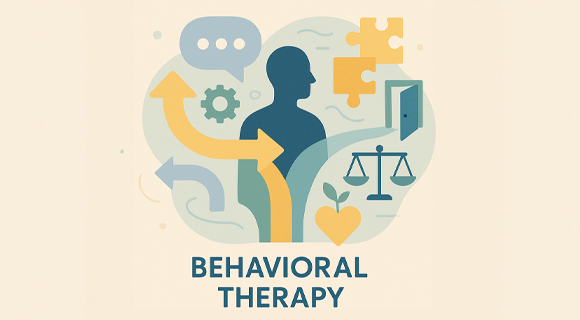
When life's challenges begin to influence your thoughts, feelings or daily habits, it is natural to seek help. One of the most effective and well -examined methods available today is behavioral therapy. This focuses on how your behavior is shaped by your environment and experiences, and it provides a practical strategy to make a positive, permanent change.
In this blog we will find out what behavioral therapy is, different types, how it works, and why it may be the right choice for you or someone you love.
What Is Behavioral Therapy?
Behavioral therapy is a form of psychotherapy that helps people recognize and replace unhealthy or unproductive behavior patterns. Instead of focusing only on the past, it looks at your current behaviors and how they affect your well-being. The goal is simple: to change harmful habits with healthy, more positive behavior.
This approach is widely used to treat conditions such as anxiety, depression, phobia, bipolar disorder, drug intake and more. What makes behavioral therapy effective focuses on action-oriented steps that create average improvement in daily life.
Types of Behavioral Therapy
There are many types of behavioral therapy, designed to address each specific requirements:
-
Cognitive behavioral therapy (CBT): One of the most popular methods, CBT combines behavioral techniques and combines how ideas affect tasks. It is especially effective for anxiety and depression.
-
Dialectical behavioral therapy (DBT): DBT learns emotional regulation, crisis tolerance and mutual efficiency, which was originally developed for borderline personality disorder.
-
Exposure Therapy: Usually used for phobias and post-tromatic stress disorder (PTSD), this therapy helps individuals to face anxiety in a safe, controlled environment.
-
Acceptance and Commitment Therapy (ACT): Focus on accepting tough feelings while committed to personal development and values-operated tasks.
-
Applied behavioral analysis (ABA): Often used for autism reduces ABA negatives and strengthens positive behavior.
Each type of behavioral therapy is designed to meet unique challenges, but they all share a general goal - individuals who have meaningful, permanent changes.
How Does Behavioral Therapy Work?
Behavioral therapy identifies unhealthy behaviors and the triggers that cause them.When these patterns are recognized, a doctor helps you develop practical skills to change. For example, if the avoidance of avoidance, treatment can gradually meet unpleasant conditions in a management manner.
The session often includes:
-
Measure with your therapist
-
Disciplinary strategies
-
Reciprocity
-
Tracking of progress over time
Applications of Behavioral Therapy
Behavior therapy is versatile and can be used in many areas of life, including:
-
Mental health disorders: Effective for anxiety, depression, PTSD and bipolar disorder.
-
Recovery of addiction recovery: Helps identify the trigger and helps change the destructive habits with a healthy copy system.
-
Child and adolescent problems: ADHD supports children struggling with behavioral challenges or social difficulties.
-
Relationship conflict: Improves communication and problem solving in couples and families.
-
Every day Stress Handling: Teaches equipment to handle daily pressure and improve the general flexibility.
Benefits of Behavioral Therapy
People who go through behavioral therapy often notice reforms such as:
-
Symptoms of anxiety and depression decreased
-
Better emotional regulation
-
Better relationships and communication skills
-
Strong coping strategies for stress and challenges
-
More self -confidence and flexibility
Because it is evidence -based, behavioral therapy is very reliable in the mental health sector and is often recommended as the first row treatment.
How to Get Started in Behavioral Therapy
It's easy to start as much as you can think. First of all, reflect on the challenges you face and whether they include recurrent behavior or habits you want to change. Now, a licensed therapist specializes in behavioral therapy.
The first session usually involves an evaluation, where your therapist learns about your history, current conflicts and goals. Together you will create an individual treatment plan designed to meet your requirements.
How to Find a Behavioral Therapist
Finding the right behavior A doctor is more than just identification - it's about finding someone who understands your needs and feels supported by you. A licensed professional with experience in behavioral therapy can lead you through challenges such as anxiety, trauma or perfect techniques such as behavioral concerns. Relaxation and faith are important, as therapeutic relationships play a major role in success. Availability also means something, whether you like sessions or telecommunications facilities. In Rise Behavioral Health, our team provides kind, evidence -based behavioral therapy that suits children, adolescents and adults.
Conclusion
Behavioral therapy is a powerful tool for someone who wants to make positive changes in life. By focusing on practical steps, it allows individuals to break the harmful patterns and develop healthy ways of thinking, feeling and acting. Whether you work with a specific mental health or just want to improve the quality of life, behavioral therapy can help you get ahead with self-function.
FAQ’s
1. What do you do in behavior therapy?
In behavioral therapy, you work with a therapist to identify negative behavior, fight strategies and practice healthy reactions. Sessions often include practice, goal development and skill -creating activities.
2. How does Behavioral Therapy help bipolar disorder?
The behavioral treatment helps people with bipolar disorders by teaching routine, fighting strategies and identifying early warning signals on mood changes. Combined with the substance it supports stability and long -term control.
3. Is Behavioral Therapy Effective for Anxiety?
Yes, behavioral therapy is especially effective in the treatment of anxiety disorders by addressing both ideas and behaviors that provide fuel with anxiety by addressing both ideas and behavior.
4. How long does Behavioral Therapy usually take?
The length varies depending on individual needs. Some people benefit from a few months, while others can continue to do treatment for a year or more to maintain progress.




Comments